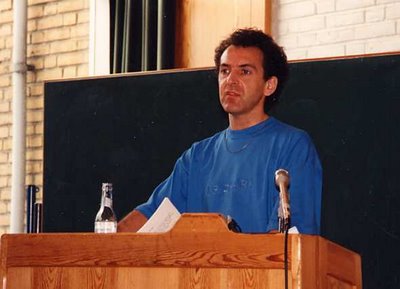Freedom dies a little.
 It is our sad duty to report that Dr. Chris Tame died today after a terrible bout with cancer. Only yesterday Chris emailed us saying that "amazingly" he was still here "but not much longer." But given that he made it through a bad time and was feeling better we did not expect it so soon.
It is our sad duty to report that Dr. Chris Tame died today after a terrible bout with cancer. Only yesterday Chris emailed us saying that "amazingly" he was still here "but not much longer." But given that he made it through a bad time and was feeling better we did not expect it so soon. Chris was the founder and president of the Libertarian Alliance in the UK. He was a prolific writer and long time activist for liberty. Kenneth Gregg has written a few paragraphs on his blog Classcial Liberal (we didn't know about the name of his site when our blog was started). I would like to quote Kenneth:
Former director of the Freedom Organisation for the Right to Enjoy Smoking Tobacco (FOREST) he wrote extensively over the years in Britain and elsewhere. Tame edited The Bibliography of Freedom for the Centre for Policy Studies and contributed to The Case for Private Enterprise, The New Right Enlightenment and The Politics of Crime Control. His essays have appeared in such journals as The Jewish Journal of Sociology, Il Politico, Science and Public Policy, The Journal of Social, Political and Economic Studies, Werifrei and Economic Affairs.
A graduate in American Studies from Hull University, he was later awarded a PhD from Middlesex University. A public affairs professional who has worked in a variety of fields, he is one of Britain’s best known libertarian broadcasters and writers.
With his kind and generous personality, always willing to encourage young libertarians, Dr. Tame has been an inspiration to a generation of British libertarians. He will be greatly missed.
Mr. Gregg is correct. Chris was always willing to help young libertarians and recently joined the Centre for Liberal Studies advisory board which will be working to spread classical liberal ideas to university students. Chris had sent through an email on ideas regarding the Free Student Network, of which this blog will be one part. The Centre for Liberal Studies will be considering how to honour Chris, perhaps with a memorial fund to help with, what he called the "transmission" problem of passing classical liberal ideas on to the next generation.
Labels: Chris Tame
 DiggIt!
DiggIt! Reddit
Reddit Del.icio.us
Del.icio.us

<< Home